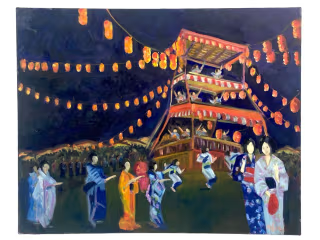Trivia: Goddess of Crossroads, Magic, and the Night
0
Ghostwriter
Blog Writer
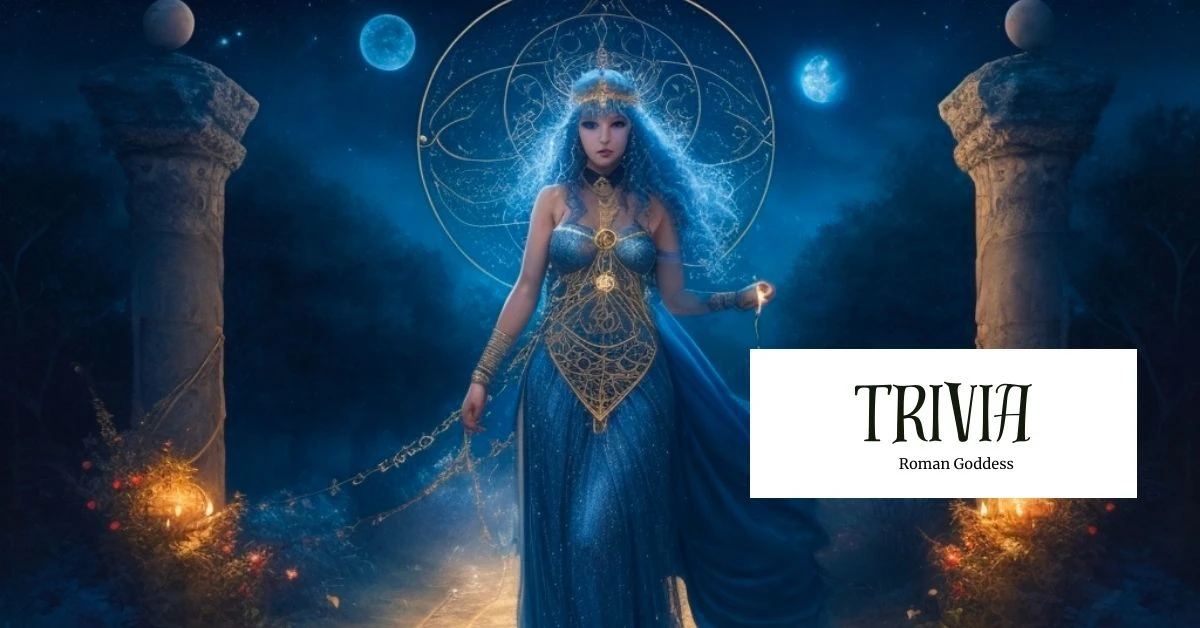
Within the extensive tapestry of Roman mythology exists a deity of unparalleled complexity and fascination known as Trivia. This mysterious goddess, referred to as Hekate Trivia or simply Hekate, possesses a wide-reaching influence spanning numerous domains. Trivia is associated with various elements, from magic, witchcraft, and crossroads to the underworld, ghosts, necromancy, and even the moon’s dark side. Unlike other deities, she is not typically identified as a specific singular domain goddess. Instead, her multifaceted nature is revealed through her numerous titles, mystical abilities, captivating characteristics, and potent symbols. All of these have significantly contributed to the shaping of ancient Roman culture and continue to captivate the imagination of contemporary enthusiasts.
Overview of Trivia
The origins of this goddess are steeped in captivating myth and legend. Trivia’s name derives from the Latin term “trivium,” associated with the three-way crossroads often related to her worship (“Trivia”). These crossroads signify the intersection and divergence of paths and serve as a potent metaphor for Trivia’s multifaceted nature and deep-rooted influence on Roman mythology (“Who Is Trivia in Roman Mythology?”).
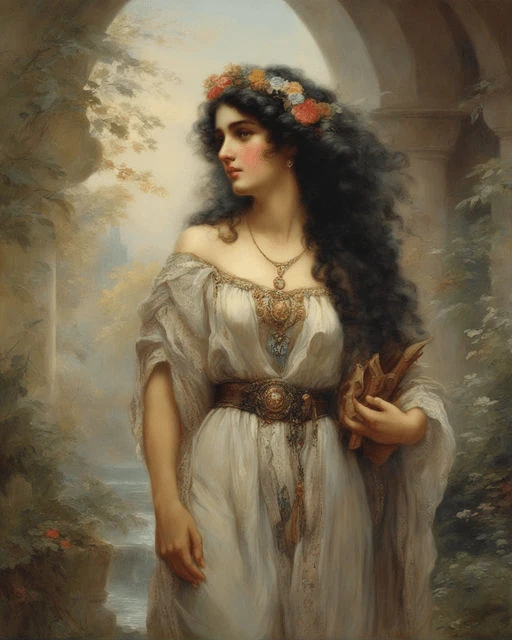
Source: Playground AI
Titles
Goddess of Magic
Goddess of Fertility
Queen of Crossroads
Guardian of the Night
Abilities
Trivia boasts a multifaceted nature that is highlighted by her varied mystical abilities. One of her most potent powers is her gift of divination, which enables her to unearth hidden knowledge and look into the future. As a result, she is revered as a patron of divination practices and guides those seeking insight into the unknown (“Trivia”). Additionally, Trivia’s remarkable shape-shifting prowess allows her to seamlessly alter her form, adapting to various situations and contexts and reflecting her multifaceted presence.
Furthermore, Trivia’s profound connection to magic allows her to cast spells, manipulate events, and safeguard those who invoke her name (“Who Is Trivia in Roman Mythology?”). As a formidable figure in sorcery and enchantments, she wields her mystical powers to shape destinies and protect those under her safety. Her role as a “Guide of Souls” is another significant facet of her magical repertoire, where she guides the souls of the departed through the intricate passages of the underworld. With her torches illuminating the way, she ensures these souls’ safe and secure transition to the afterlife, navigating the mysteries of the realm beyond mortality (“Trivia”).
Characteristics
With great poise and precision, Trivia, the Roman goddess, is depicted in various works of art. Her ethereal beauty and multifaceted nature are meticulously crafted, drawing mortals and deities into her enigmatic realm. At the heart of her visual depiction lies her cascading mane of long, flowing hair, which symbolizes her profound connection to the night and its mysteries. This symbolic representation extends beyond the mere aesthetic and reflects her dominion over the realm of the night (“Trivia”). Trivia is a passive observer of the night and a living embodiment of its enigmatic beauty and the secrets it conceals.
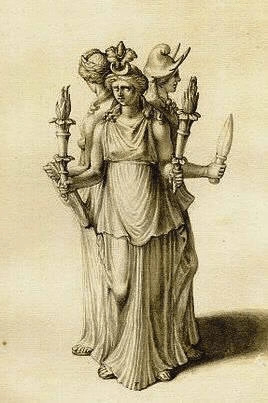
Source: By the gods!
Traits
The character of Trivia is imbued with an aura of profound mystery, which she shrouds herself in, reserving her wisdom and secrets for those she deems worthy of her revelations. This enigmatic nature is deeply intertwined with her role as a guardian of the night and crossroads, where choices are made and paths diverge. Here, she takes on a protective mantle, offering solace and shelter to travelers and those in need, particularly during the obscurity of the night.
Wisdom is another hallmark of Trivia’s persona (“Trivia”), as she embodies a deep well of insight and foresight as a deity closely associated with magic, divination, and hidden knowledge. Her wisdom is a testament to her role as a guide through the mystical and the unknown. However, one of the most intriguing facets of Trivia’s character is her fierce independence (“Who Is Trivia in Roman Mythology?”). She operates on her terms, liable to no one but herself. This quality underscores her enigmatic nature and adds an air of autonomy to her character, reinforcing her status as a deity who transcends the constraints of mortal expectations.
Symbols
The Three-Way Crossroads is a paramount emblem among Trivia’s symbols, epitomizing her primary domain (“Trivia”). These crossroads, where diverging paths intersect, serve as the physical locations of many of Trivia’s rituals and are potent metaphors for the choices and decisions that shape human life. Trivia presides over these pivotal moments, offering guidance and protection to those who seek her counsel. Another iconic symbol associated with Trivia is the torch, often depicted as being carried aloft by the goddess. This luminous emblem signifies her role as a guiding light in the darkness, both literally and metaphorically. As such, it reinforces her status as a protector and guardian, particularly in the obscurity of the night. The key is yet another potent symbol linked to Trivia, representing her position as a gatekeeper and guardian of hidden knowledge (“Who Is Trivia in Roman Mythology?”). This symbol captures her role in controlling access to the mysteries of the universe, reinforcing her enigmatic nature as a deity who safeguards the profound secrets of the cosmos.
These symbols add depth and layers to the mysterious character of Trivia, encapsulating her domains, attributes, and role as a guide, guardian, and keeper of arcane wisdom. They enrich her visual representation and serve as potent reminders of her enduring influence within Roman mythology.
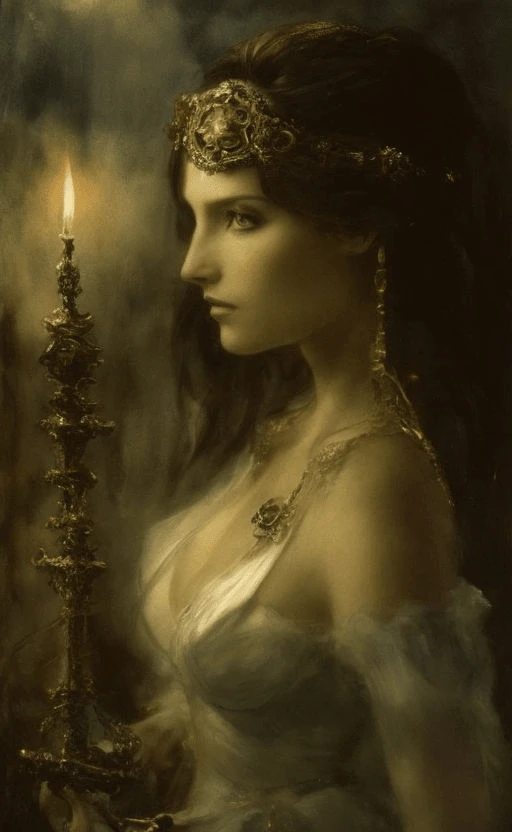
Source: Playground AI
Festivals and Rituals
It is widely known that Trivia, the goddess of crossroads, is a highly revered deity in ancient Roman mythology. Her followers have developed various ritualistic practices to honor and seek her guidance and protection. One of the most prominent celebrations is “Trivia’s Night,” which occurs on the night of the full moon. Devotees gather at Crossroads and offer her various offerings, including food, drink, and incense. This ritual is an earnest endeavor to acknowledge her as a guardian of crossroads and a beacon of illumination in the darkness (“Who Is Trivia in Roman Mythology?”). Another ritualistic practice is the “Deipnon,” a monthly meal offered to the goddess on the last day of each lunar month (“Trivia”). This offering is made to appease her and avert any potentially malevolent aspects she might possess. It serves as a gesture of reverence and supplication to ensure her benevolent influence throughout the lunar cycle.
Moreover, Trivia played a significant role in necromantic rituals and practices. Her assistance was sought to navigate the realm of the spirits and the mysteries of the afterlife during specific necromantic ceremonies, often conducted at crossroads or in the shroud of the night (“Trivia”).
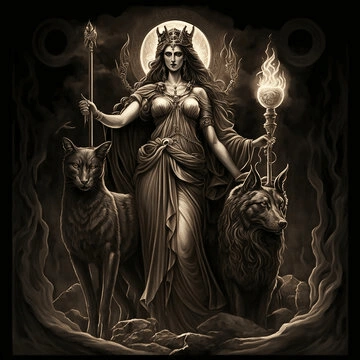
Source: Adobe stock
Legends associated with Trivia
In the vast expanse of Roman mythology, the goddess Trivia holds a unique and mysterious presence. A plethora of legends and narratives have intricately woven a complex history, unveiling the profound facets of her character. These tales, steeped in antiquity, offer deep insights into her origins, indelible imprint on the Roman mythos, and enduring sway over the intricacies of human experience. This exploration studies the captivating legends that enshroud the Roman goddess Trivia.
Origin story
The birth of the Roman goddess Trivia is shrouded in the mists of antiquity, much like many aspects of her multifaceted character. While Trivia’s origin story lacks a singular, universally accepted narrative, her existence and significance draw from a blend of Roman, Greek, and Etruscan traditions (Homework Study). In Roman mythology, “Trivia” bears profound importance, etymologically rooted in the Latin term “trivium,” which signifies the three-way crossroads where her worship predominantly took place. These crossroads were not just physical intersections; they became emblematic of the choices, decisions, and diverging paths that defined the human experience (Homework Study).
Trivia’s origin story is encapsulated within the symbolic significance of these crossroads, which resonate with her multifaceted essence and profound impact on Roman culture. The crossroads, where mortals encountered decisive moments and made life-altering choices, became a poignant metaphor for the goddess herself. It mirrored her role as a guardian and guide, presiding over the pivotal junctures of human existence (Homework Study).
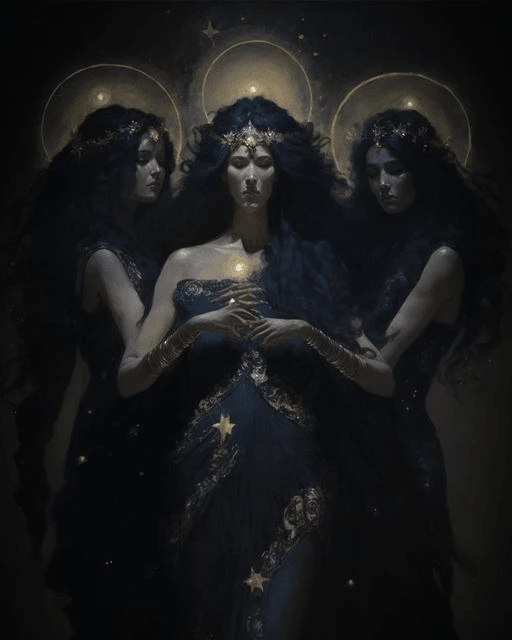
Source: Pinterest
Trivia’s Role in Guiding Human Destiny
Within the realm of Roman mythology, a compelling legend intertwines the goddess Trivia with the concept of fate, albeit distinct from the Greek myth of the Three Fates. The Roman belief held that the goddesses Parcae, also known as the Fates, were responsible for weaving and measuring the threads of human destiny (“Trivia”). These three sisters, Nona, Decima, and Morta, presided over every individual’s birth, life, and death, determining the course of their existence.
In this Roman legend, Trivia’s role was not controlling these threads; instead, she stood as a guardian and guide at the crossroads of life. As individuals reached crucial junctures in their earthly journeys, they often turned to Trivia for guidance and protection, seeking her blessings and wisdom. Her presence at these crossroads symbolized the significance of choices and decisions in shaping one’s fate. Trivia’s influence extended beyond mere destiny-weaving; she embodied the profound impact of free will and its role in navigating the complex web of human life (“Trivia”).
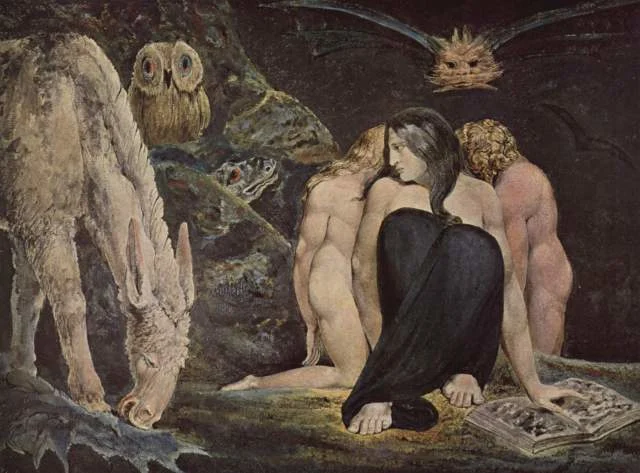
Source: Wordpress
The Divine Patrons of Trivia: Exploring Her Elevated Status
Another captivating legend explores the divine patrons of Trivia, highlighting her elevated status within the Roman pantheon. Trivia, the recognized deity of immense wisdom and insight, was believed to be under the divine patronage of the great god Jupiter and the goddess Juno (“Who Is Trivia in Roman Mythology?”). This esteemed connection to two of the most powerful deities in Roman mythology underscores her profound significance within the pantheon.
In this intriguing legend, Trivia’s role as a guide through the intricate labyrinth of life’s choices was further enriched by the protective mantle of Jupiter and Juno. These divine figures, known for their authority over the celestial realms, bestowed a heightened sense of purpose and power upon Trivia (“Who Is Trivia in Roman Mythology?”). Her association with the mysteries of the night, her role as a guardian of crossroads, and her influence over magic and divination became intertwined with the celestial realms governed by Jupiter and Juno.
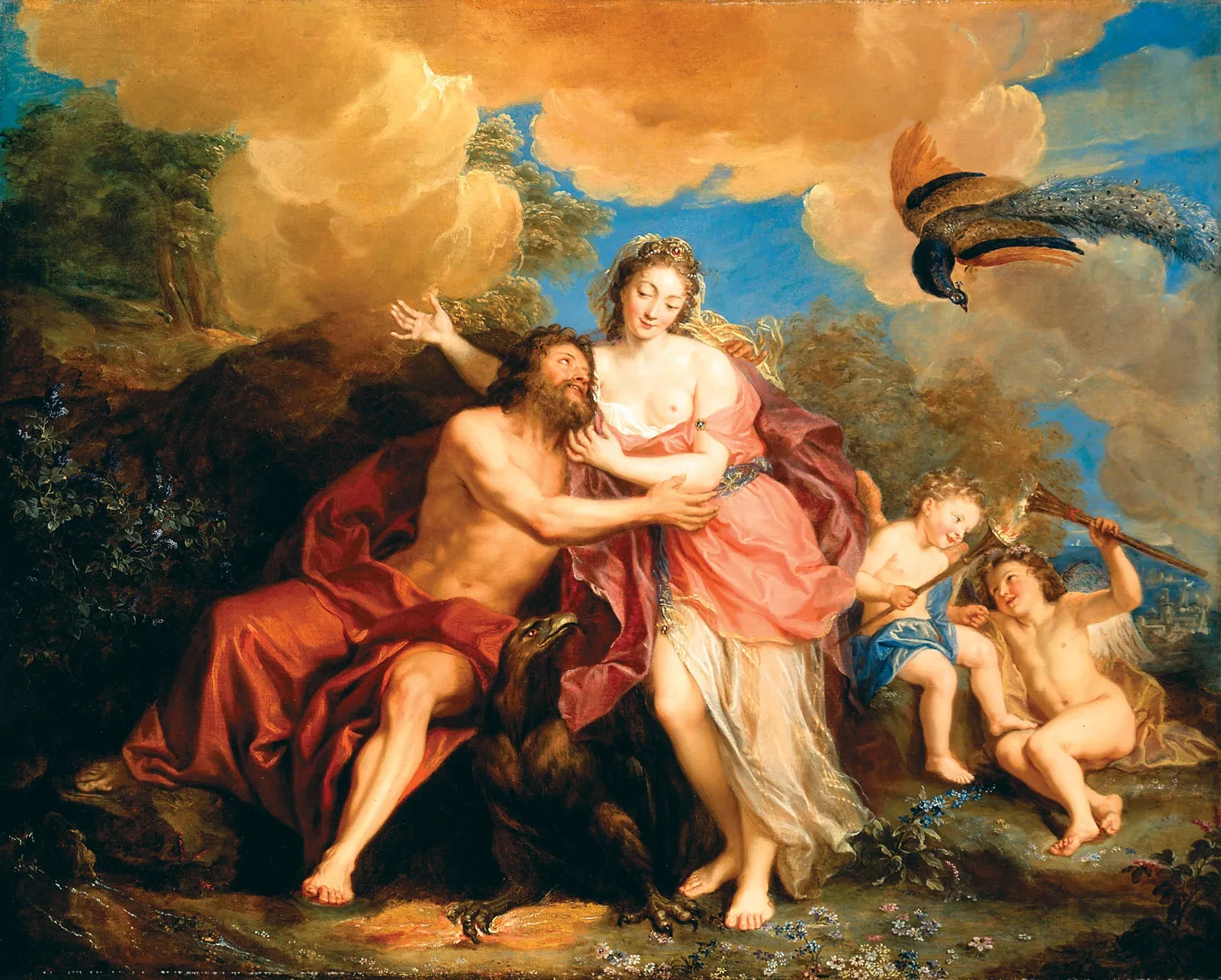
Source: Britannica
Influences of other religions/cultures on Trivia
The recognition and perception of the deity Trivia extended beyond the confines of Roman mythology, as her character and attributes were shaped by the influences of various religions and cultures, enriching her identity. Etruscan traditions, in particular, significantly impacted Trivia’s character, emphasizing her association with fertility and motherhood (“Trivia”). In Etruscan mythology, she was frequently depicted as a nurturing and maternal figure overseeing childbirth and familial well-being. This facet of Trivia’s persona reflects the cultural exchange and syncretism between Roman and Etruscan belief systems.
In Greek mythology, the goddess Hecate shares notable similarities with Trivia. Like Trivia’s Roman aspects, Hecate is linked to crossroads, magic, and the night. This parallel highlights the cultural exchange and influence between Roman and Greek belief systems, hinting that Trivia’s multifaceted nature was not restricted to Roman culture alone but was shaped by the broader Mediterranean religious context (“Trivia”).
Modern appearances
The deity Trivia’s legacy has transcended the boundaries of ancient Roman mythology, thereby establishing her relevance within modern-day Neopagan and Wiccan traditions. Her associations with divination, magic, and the night align flawlessly with the beliefs and practices of contemporary practitioners in these spiritual paths. Within these traditions, Trivia is revered as a goddess who symbolizes the profound mysteries of the unseen world and the transformative power of choice at the crossroads of life (“Trivia”).
The Neopagan and Wiccan practices embrace Trivia’s affiliation with the night and her role as a guide in the darkness, which resonate with those seeking to explore spirituality’s mystical and esoteric aspects. Her embodiment of the enigmatic and her affinity for the magical arts make her an apt figure for those who seek wisdom and guidance in the shadows of the unknown (“Who Is Trivia in Roman Mythology?”).
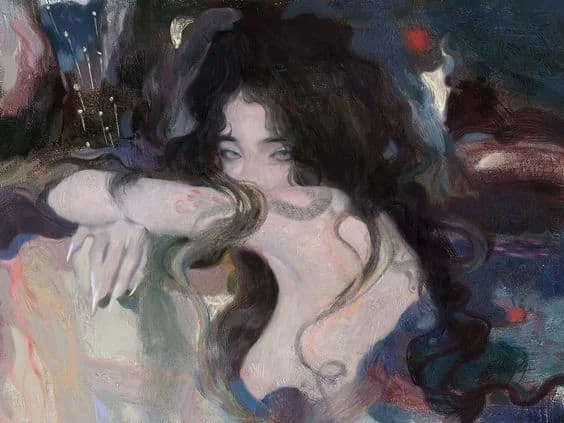
Source: Pinterest
Final thoughts
The goddess Trivia, renowned for her intricate web of legends, diverse influences, and unwavering presence in contemporary culture, is a testament to Roman mythology’s depth and richness. Her multifaceted attributes, ranging from crossroads to magic to the night, reflect the complexities inherent in the human experience. Trivia’s legendary tales depict her as a guardian, a guiding force, and an embodiment of the choices that define our lives, encapsulating the enigmatic and mystical dimensions of the Roman pantheon. As such, Trivia remains an enduring symbol of myth and legend’s profound and enduring power in the human psyche.
References
“Trivia.” Camp Jupiter Wiki, campjupiter.fandom.com/wiki/Trivia.
“Trivia.” Gods and Demons Wiki, gods-and-demons.fandom.com/wiki/Trivia. Accessed 22 Oct. 2023.
“Who Is Trivia in Roman Mythology?” Study.com, 2023, homework.study.com/explanation/who-is-trivia-in-roman-mythology.html. Accessed 22 Oct. 2023.
Did we miss something? Do you know another aspect of this legend? Don't hesitate to reach out!
Like this project
0
Posted Oct 13, 2023
A client hired me to write several informative pieces on Roman Goddesses, and this blog post centers around the Goddess of Night and Magic, Trivia.
Likes
0
Views
1591
Tags
Ghostwriter
Blog Writer




